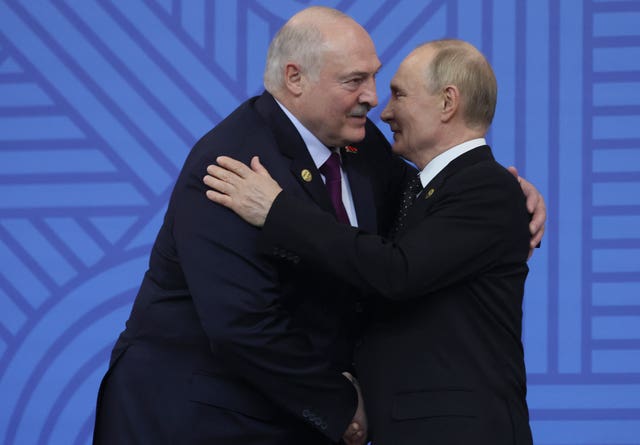Belarus targets hundreds for showing solidarity with Ukraine
At least 12 Ukrainians in Belarus have been convicted on charges of ‘extremism’ and purported links to Ukrainian security agencies.

Hundreds of people in Belarus who have shown solidarity with Ukraine have been arrested in a sweeping crackdown under authoritarian President Alexander Lukashenko, a key ally of Russia in the war, human rights activists said.
At least 1,671 Belarusians were detained for their anti-war stance or for expressing solidarity with Ukraine, and at least 200 of them have been given prison sentences ranging from one to 25 years on charges of “extremism” and “conspiracy against the state”, according to a report by the Viasna human rights centre.
In addition to the arrests, convictions and prison sentences, the report alleged that people were tortured, held in inhumane conditions and given fines, with some subjected to forced psychiatric treatment.
At least 12 Ukrainians in Belarus have been convicted on charges of “extremism” and purported links to Ukrainian security agencies, and given prison terms, said Ihor Kyzym, a Ukrainian diplomat who previously served as that country’s ambassador to Belarus.

Those sentenced include a 16-year-old student, a Ukrainian official and people who have relatives in Belarus, he said earlier this week.
Belarus shares a 1,084-kilometre (670-mile) border with Ukraine, and the two countries have longstanding cultural and historic ties. Many in southern Belarus have relatives across the frontier.
Mr Lukashenko, who has ruled Belarus for more than 30 years, has relied on Moscow’s subsidies and support. He allowed the Kremlin to use his country’s territory to invade Ukraine in February 2022, as well as to deploy some of Russia’s tactical nuclear weapons in Belarus.
Belarusian authorities have intensified their crackdown on dissent ahead of a presidential election in January in which Mr Lukashenko is seeking a seventh term.
On Tuesday, its interior ministry launched anti-riot drills, a signal from the government that it will not tolerate any protests.
Authorities responded to massive protests following the widely disputed 2020 election of Mr Lukashenko with a wide-ranging crackdown in which about 65,000 people were arrested.
Major opposition figures were either imprisoned or fled the country. Human rights activists say Belarus is holding about 1,300 political prisoners, with many of them denied adequate medical care and contact with their families.
The crackdown has escalated in recent weeks, with hundreds arrested in raids targeting relatives and friends of political prisoners and participants in online chats organised by residents of apartment buildings in various cities.
At the same time, Mr Lukashenko has pardoned some political prisoners in an apparent signal that he is open for dialogue with the US and the European Union, which imposed sanctions because of his crackdowns on dissent.
Mr Lukashenko’s office announced on Wednesday that another group of 32 political prisoners have been freed, adding to the 146 who were pardoned since July. Those freed had health problems, wrote petitions for pardons and said they repented.
“There have been contradictory signals from the government, with repressions intensifying, and at the same time small numbers of little-known people granted pardon,” said Viasna’s Pavel Sapelka.
“Just in November, more than 200 people have been arrested and several dozen activists have been convicted and sentenced to long prison terms.”





